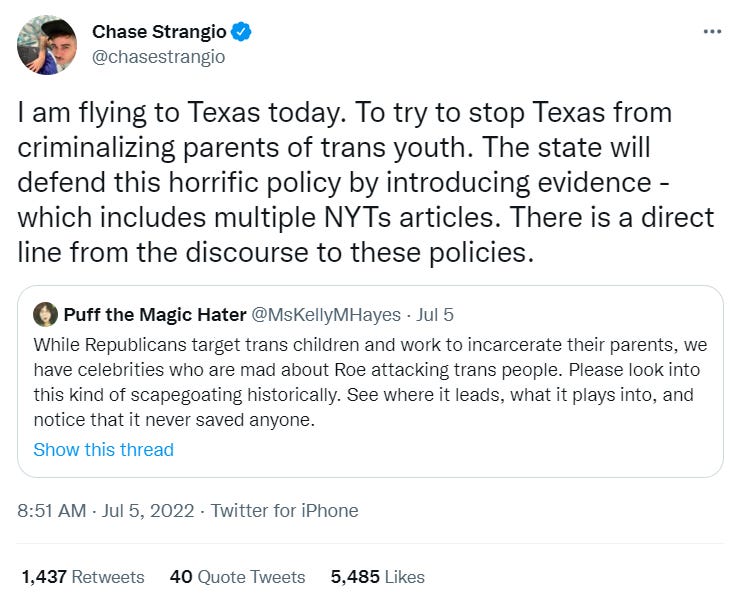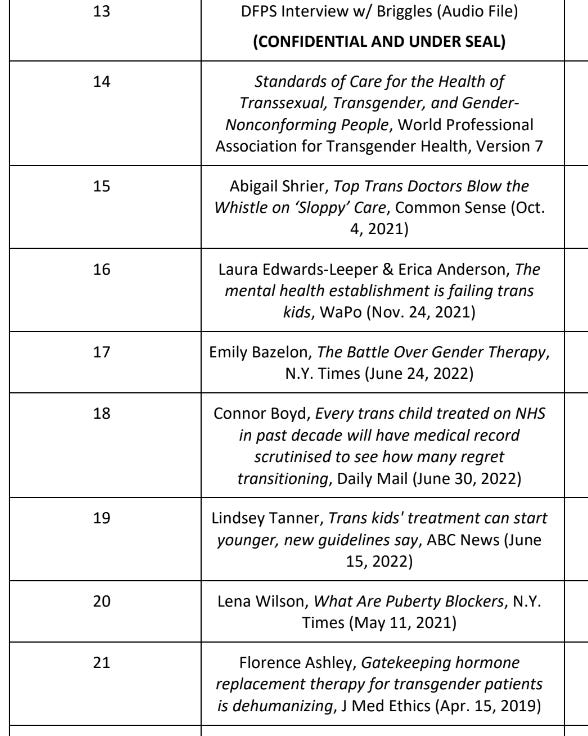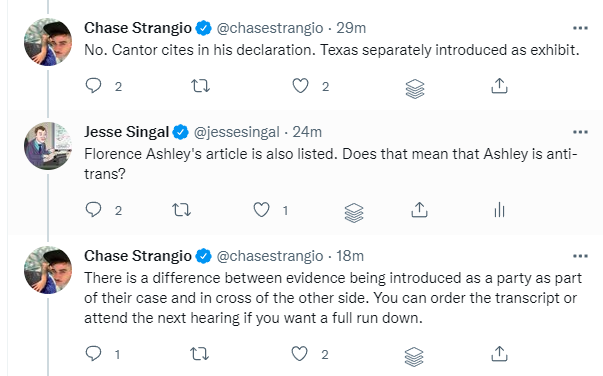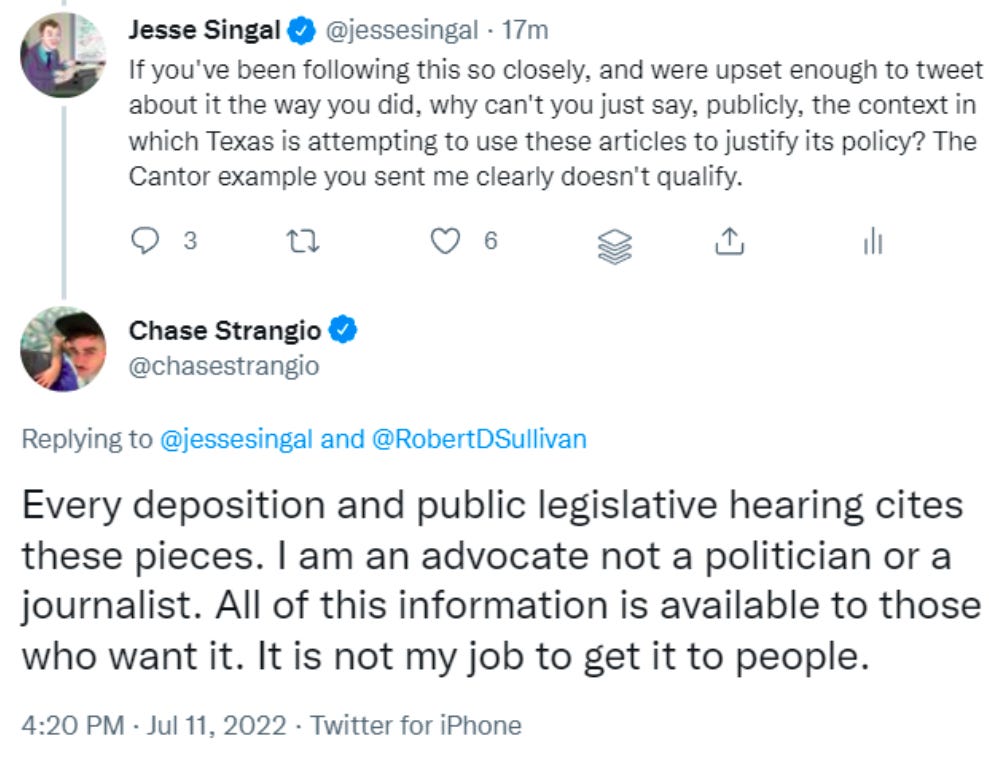On Rashida Tlaib And Chase Strangio’s Ridiculous, Bad-Faith Attack On The New York Times (Updated)
“Bad people could use your words to do bad things” is, in most cases, a nonsensical argument
Rep. Rashida Tlaib, a Democrat from Michigan, just launched a broadside against The New York Times.
It came in the form of a tweetstorm that reads as follows, numbering and link added by me:
(1) The @nytimes has been providing a platform for transphobic hate & propaganda, with horrifying consequences. Texas just entered NYT articles into evidence to push for the TX Dept of Family & Protective Services to take trans kids away from their supportive parents. (2) During escalating assaults on trans people & trans rights nationwide, the New York Times is featuring writers debating whether trans people should even exist and scapegoating this already-marginalized community. One way to act in solidarity is to sign now: Sign now to tell the New York Times to stop providing a dangerous platform for transphobic hate, and instead amplify trans voices. As trans lawyer and activist Chase Strangio has said: “The NYT's horrible coverage of and fixation on trans people has been central to the progression of anti-trans bills and policies nationally… https://bit.ly/nytpetition (3) Thank you @chasestrangio for sounding the alarm and asking cis people to speak up. To trans & non-binary people: I'm with you. I’m going to keep fighting for your right to exist, to be safe as your full authentic selves, & to thrive. Our safety & liberation is intertwined. (4) The fights for trans rights and reproductive justice are wrapped up together. Our right to bodily autonomy—our ability to make decisions about our own bodies—is under threat. This affects ALL of us. We must be in solidarity to defeat the growing fascist movement to control us.
It goes almost without saying that the Times has not published anything “debating whether trans people should even exist” — this seems to just be completely made-up, or relying on a very esoteric definition of “exist.”
CNN’s Reliable Sources newsletter, to its credit, wasn’t having it.
Tlaib v. Times
Rep. Rashida Tlaib is capitalizing on left-wing anger at The New York Times to... add people to her campaign mailing list.
Tlaib asserted on Monday that the NYT "has been providing a platform for transphobic hate & propaganda, with horrifying consequences." She linked to a PinkNews recap of the backlash to Emily Bazelon's recent article, "The Battle Over Gender Therapy," and referenced the criticism of Pamela Paul's recent column, "The Far Right and Far Left Agree on One Thing: Women Don't Count." Tlaib alleged -- without any evidence I can find -- that the Times is "featuring writers debating whether trans people should even exist." And she she urged people to challenge the Times by signing a form... which adds them to a campaign listserv. This practice is common among candidates, but that doesn't make it any less nauseating...
Anyway, the rumor about the Times’ supposed complicity in Texas’s policy was indeed sparked by Strangio, an ACLU lawyer who specializes in trans issues who is also one of its highest profile (and, full disclosure, combative and libel-ish) staffers, a little more than a week ago.
At the time, a segment of Twitter was furious about a Pamela Paul column in the Times arguing that the word “woman” was under attack in progressive spaces, and tying that trajectory to the right-wing attack on abortion rights. For what it’s worth, I thought the column was mostly a reasonable critique of a very real phenomenon, but that Paul and her editor shot themselves in the foot a little with false equivalency language such as this line up top: “[T]he far right and the far left have found the one thing they can agree on: Women don’t count.”
Ehhhhhh.
It’s regrettable that some abortion rights groups stopped using the word “women” (which I don’t think is necessary from an inclusivity perspective, anyway), but they’re still, at the end of day, pushing for reproductive rights for women, which is the opposite of what some conservatives are doing. So it comes across as a bit forced to not at least acknowledge the asymmetry here.
But it was by no means some off-the-rails, offensive column — it didn’t even criticize trans people or trans rights groups per se, but rather the linguistic decisions made by powerful liberal organizations like the ACLU (last seen scrubbing “women” from an RBG quote). Twitter being Twitter, there’s no such thing as a flawed column. Everything is a harbinger of fascism. So it went here: The Twitter discourse about Paul’s column was completely unhinged. It could be people were already worked up from how upset they got pretending another Times-related article — Emily Bazelon’s New York Times Magazine piece on youth transition — was itself deeply transphobic. It must be tiring to wake up every week and find another example of how The New York Times is Literally Fascist, and I don’t envy the people stuck in this world.
I think it’s one thing for people on Twitter to be hysterical. That is normal, and progressives certainly have no monopoly on that behavior. I think it’s another thing for a sitting member of Congress to launch a petition targeting a news outlet, and Strangio was how we got there. On July 5, he seeded the rumor that the Times was partly responsible for Texas’s horrific attempts to separate trans kids from their parents: “I am flying to Texas today,” he tweeted. “To try to stop Texas from criminalizing parents of trans youth. The state will defend this horrific policy by introducing evidence - which includes multiple NYTs articles. There is a direct line from the discourse to these policies.”
Obviously, this got some attention, and Tlaib blasted it into the attentional stratosphere by making this claim the center of an outraged tweetstorm and petition attempt. As CNN indicated, I bet anyone who signs her pointless petition (email and zip code required) will get a fundraising appeal and/or have their info shared with other progressive organizations hungry for data:
I found the specific charge rather vague. A lot of things are “entered into evidence.” I reached out to Strangio on Twitter to ask which legal documents he was referring to, and he helpfully emailed them to me.
One is the Defendants’ Exhibit List (PDF) from the ongoing PFLAG v. Abbott lawsuit — that is, a list of the pieces of evidence that Abbott and others in his administration are introducing. Bazelon’s article is indeed on the list.
But so is a lot of stuff! Including the World Professional Association for Transgender Health Standards of Care, a vanilla-looking Times article headlined “What Are Puberty Blockers?,” and an article by Florence Ashley, a trans activist and writer, arguing that it should be easier for transgender people to access hormones.
It seems so obvious as to go without saying that the mere presence of an article on this list doesn’t mean the author is a transphobe or did anything wrong. Are the authors of the WPATH SoC bigots? Is Florence Ashley?
The only other document Strangio sent me was an expert declaration (PDF) from James Cantor, a psychologist and outspoken skeptic of youth transition, filed by Abbott et al. The one mention of anything from the Times comes in this context:
There is no basis by which the petition and supporting documents to claim there is a “medical consensus” (Plaintiff petition, para 16) or “established best practices” (Plaintiff petition, para 121), to follow guidelines that are “well-established” (Plaintiff petition, para 47) “widely accepted” (Plaintiff petition, para 57). Dr. Brady and Dr. Antommaria are in error to assert there exists a consensus where there does not. Indeed, that there exists enormous controversy and disagreement among experts is itself the topic of major media coverage, including the New York Times’ The Battle Over Gender Therapy: More teenagers than ever are seeking transitions, but the medical community that treats them is deeply divided about why—and what to do to help them. As detailed within its own section of the present report, the full scientific literature on the outcomes of medical transition of minors has been evaluated by the health care departments of several national governments, including Sweden and the U.K., with each finding the research to be of very low quality, receiving the lowest quality ratings available. No matter one’s views on these issues, they cannot be resolved when their very existence is denied. [footnotes omitted]
Whether or not Cantor’s analysis is correct doesn’t matter here; what matters is that he is using Bazelon’s article to support the claim that there is disagreement among experts when it comes to the best practices for youth medical transition. This is plainly true. Does it make sense to blame Emily Bazelon for something the State of Texas did because a scientist ̶w̶r̶i̶t̶i̶n̶g̶ ̶i̶n̶ ̶s̶u̶p̶p̶o̶r̶t̶ ̶o̶f̶ ̶t̶h̶e̶ ̶p̶o̶l̶i̶c̶y̶ ̶i̶n̶ ̶q̶u̶e̶s̶t̶i̶o̶n̶ cited her saying something that’s… true? (Update: After this piece went up, Cantor DMed me to say he didn’t think this was a completely accurate description of his role here. “I did indeed have to put thought into how and when I would be willing to participate in any given case, and I eventually came to an Ira Glasser position: I will provide any and all science to anyone who asks, but what they do with it is no up to me.”)
Of course it doesn’t. This is a version of the “Hitler was a vegetarian” fallacy, which most of us pedantic nerds come across in college. Setting aside the historical question of whether Hitler was actually a vegetarian, if he was one, that’s obviously not a knock on vegetarianism! If a bad person does or says something, that doesn’t automatically make the thing in question bad. Hitler also wore boots — Nazis, in general, were big fans of boots — but boots can actually be quite useful.
It feels weird even to have to type this out, like I’m being condescending. But again, this is the basis on which a sitting member of Congress is attacking a newspaper. And everyone who has followed the recent Times controversies closely knows that really, she’s attacking an individual journalist: Emily Bazelon, who wrote the one big, controversial recent article on youth medical transition to have run in the paper or magazine. It’s just a completely bad-faith argument.
On Twitter, I pressed Strangio on all this: I pointed out that neither Bazelon’s article’s appearance on the evidence list, nor Cantor’s reference of it in his declaration, constituted evidence she (or the Times) had done anything wrong. I asked for more specific evidence to support the idea that the paper had done anything morally or journalistically questionable enough to warrant all this outrage.
Strangio didn’t have anything. Instead, he said I should fly to Texas to witness the hearings in person or order transcripts:
I realized it was time to wrap it up when Strangio said: “I am an advocate not a politician or a journalist. All of this information is available to those who want it. It is not my job to get it to people.”
This leaves us with the following sequence, more or less:
Chase Strangio: The Times is partly responsible for Texas’s horrible policy on trans youth!
Rashida Tlaib: As Chase says, the Times is partly responsible for Texas’s horrible policy on trans youth! Sign my petition!
Me: The documents you’re citing don’t seem to justify this claim at all. Do you have any other evidence?
Strangio: It’s not my job to get that for you.
As the kids online say, ¯\_(ツ)_/¯.
This Is Such A Dumb And Tired Argument
Part of the reason I jumped in to defend Bazelon is that I’ve had my own run-ins with the Bad People Will Use What You Said To Do Bad Things crowd. My own article on youth transition in The Atlantic was cited in a conservative legal brief — something my critics have mentioned on Twitter hundreds or thousands of times as ironclad proof that it was an outrageously irresponsible piece of journalism. As I pointed out, the authors of the brief misread my piece quite badly, citing it as evidence that there’s no medical consensus that transition works when my article couldn’t have been clearer in arguing the opposite.
But let’s say these conservative lawmakers had cited it correctly. For example, let’s say they’d used it as evidence to support the idea that there are some detransitioners unhappy with their gender care, and then jumped from there to the idea that youth gender medicine should be banned.
In this case, would I have done something wrong?
No, I wouldn’t have. I am a journalist, and as long as my own reporting is accurate, it is not my job to indulge in the absolutely sparklebrained fantasy that there’s any way to prevent people I disagree with from using my work as an individual link or two in a causal or argumentative chain that leads someplace I dislike or disagree with. There are detransitioners who were unhappy with their care. There is disagreement about youth medical transition more broadly.
If a journalist reports on the recovered-memory-therapy craze and the horrific damage it inflicted, someone could say, “You realize people are going to use your journalism to downplay the importance of fighting child sexual abuse, right?” And you know what? Probably! No doubt someone will do that. But if we follow this logic any further, we won’t have much journalism left, because anyone can use anything to make any argument, and people are of course quite opportunistic when they scavenge for evidence, especially evidence coming from credible-seeming sources. Unless the journalist wrote something like “And that’s why, generally speaking, we shouldn’t take child sexual abuse seriously anymore,” this critique makes no sense. Along those same lines, nowhere in Bazelon’s article did she come within light years of saying youth gender care should be banned, let alone that kids should be removed from their home if their parents let them transition.
It’s just a completely ridiculous argument to claim that journalists shouldn’t write stuff because someone, somewhere, could reference it in a way some people don’t like. The reason folks like Tlaib and Strangio don’t care that this is ridiculous is because they don’t want to argue on the merits: They can’t actually dispute what Bazelon wrote, and their goal is to just shut down this debate entirely via online shaming and to portray The New York Times as a fundamentally harmful, reactionary publication. All the better if Tlaib can raise some money in the process.
It’s also nonsensical to imagine that Greg Abbott’s or Ken Paxton’s approach to trans kids is informed, in any way, by the editorial decisions made at the Times. This is where I wonder if people are actually, no-joke delusional. These are two men who are literally trying to send the State into the homes of trans kids to remove them. It is, as I’ve said before, state-sanctioned kidnapping — an absolutely heinous policy, even if you have concerns about the strength of evidence for blockers and hormones.
The idea that this has anything to do with a long Times Magazine article that wasn’t quite pro-transition enough for online activists is just — let’s call it what it is — deranged. In light of the actual stakes here, it’s insulting. It also distracts from the actual causes of these policies. It reflects the most solipsistic, liberals-who-aren’t-left-enough-are-the-true-problem approach imaginable. This is The People’s Front of Judea reciting their grievances with the People’s Judean Front (or vice-versa — who can keep track), except it’s real life and we can’t just laugh at the YouTube clip and move on.
To be clear, I can understand the temptation from a social-media branding perspective: If Tlaib or Strangio tweet or petition angrily about Abbott or Paxton, Abbott or Paxton can (metaphorically) laugh and flip them the bird — they are the enemy! If Tlaib or Strangio tweet angrily about the Times or Emily Bazelon or other liberal would-be allies, on the other hand, that could represent a real problem for whoever they’re targeting, just because of how social and professional networks work. It is probably more effective from a marketing perspective, the collateral damage be damned. And it signals to other outlets and journalists that if they make the same mistake, they could be in for the same treatment. It would be a shame if something happened to the nice, peaceful social-media presence your publication has here.
But if you actually care about trans kids and actually oppose this policy — and Strangio is of course actually doing real work on this issue in Texas! — this is just such a ridiculous waste of time, such a shameless attention- and money-grab, that I can’t believe anyone is falling for it.
Questions? Comments? Petitions denouncing this newsletter? I’m at singalminded@gmail.com or on Twitter at @jessesingal.
Image: WASHINGTON, DC - APRIL 06: U.S. President Joe Biden (L) poses for photographs with Rep. Rashida Tlaib (D-MI) during the signing ceremony for the Postal Service Reform Act in the State Dining Room at the White House on April 06, 2022 in Washington, DC. A part of Postmaster General Louis DeJoy’s controversial 10-year restructuring plan, the law provides $107 billion to modernize and streamline the long-beleaguered Postal Service. (Photo by Chip Somodevilla/Getty Images)








Chase Strangio is a throbbbing, talking bag of personality and psychiatric disorders in the approximate form of Charlie Chaplin. Never have I seen a more disingenuous liberal attorney barking away on Twitter, which is like finding the most steroid-powered rider in the history of the Tour de France.
Ever since Stangio's jaw-dropping Slate article from years ago asserting in Book of Revelation-like overtones that anatomy is irrelevant, I've been waiting for one damn person in a sea of what has to be millions to rise up and say, "Chase Strangio is a flagrant lunatic," so that everyone else can finally exhale and stop worrying they were the only one not in on a worldwide dark joke.
There is something badly wrong with anyone who blatantly lies to millions of people a day and knows they can knock out the "tattletales" with the immediate help of Twitter's equivalent of knuckle-rapping nuns.
It's too bad Twitter is not a physical place, so that it could be purchased, evacuated of anyone still possessing humanity, and razed. I refuse to admit that people there might be as bad as they seem, so I cling to the thesis that Twitter elicits the worst and suppresses the best simultaneously in almost everyone.
I wish people would make a stronger distinction between trans people and trans activists. Trans people really are marginalized and deserve a great deal more respect and safety than they currently receive. Trans activists like Strangio, by contrast, are self-aggrandizing blowhards and cultural imperialists who believe that they alone should dictate how the rest of the world uses language. Trans people deserve better advocates.